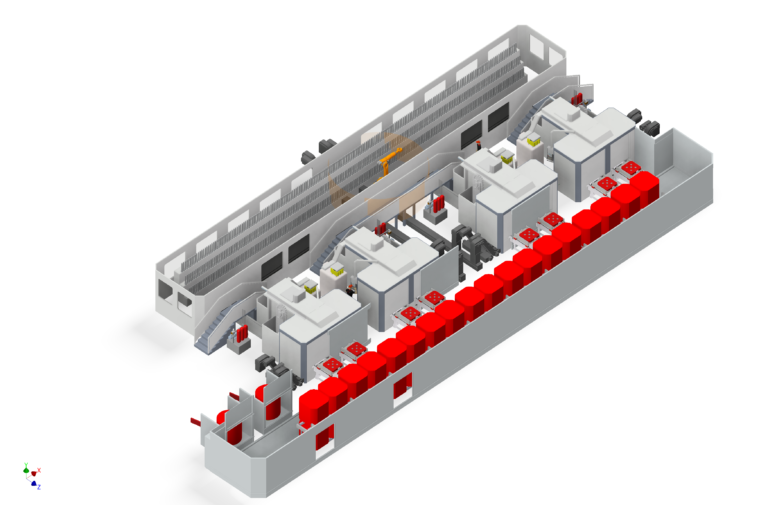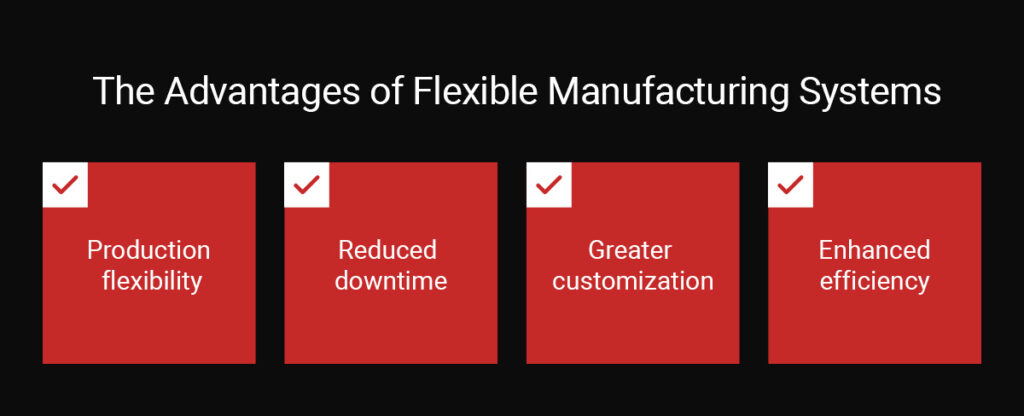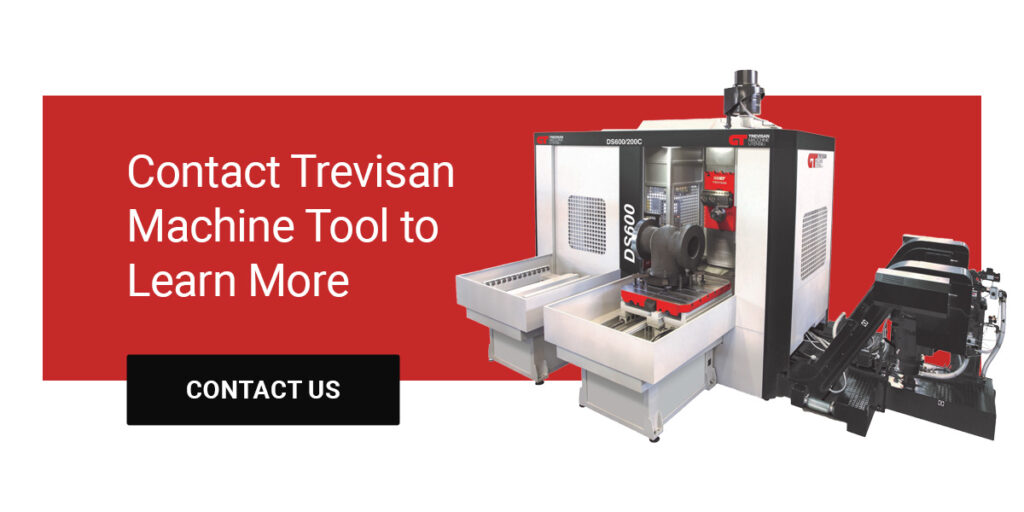
Large-scale manufacturers worldwide rely on flexible manufacturing systems (FMS) to accomplish demanding outputs. These highly adaptable, automated machining setups can easily manufacture various products and handle rapid production changes. These factors are vital for businesses that need to change product design, type and volume frequently with as little downtime as possible.
Learn how FMS works and benefits businesses in this guide by Trevisan Machine Tool. We specialize in integrated U-axis contour head machining centers and have decades of experience with challenging manufacturing projects. We also do in-house integration and can work with integrating partners.
Flexible Manufacturing System Definition
A flexible manufacturing system is a highly adaptable production setup that uses automation technology. These custom systems include a centralized computer that controls various machines, material handling systems and robots. They exist to offer manufacturers production flexibility, as you can adapt the system to accommodate varying batch sizes, product designs and process sequences. FMS are almost entirely automated to reduce labor costs and improve productivity.
Components of Flexible Manufacturing Systems
FMS comprises modular components that manufacturers can adapt and reconfigure to meet changing production requirements. The core components of an FMS include:
- Work machines: Each FMS has a unique combination of workstations to suit the manufacturer’s production requirements. These can be various robots, computer numerical control (CNC) machines, tool changers or inspection and assembly stations. Each workstation performs the required processes to turn materials into a finished piece.
- Material handling systems: FMS requires multiple material handling systems to achieve complete automation. These hold and transport parts to each workstation in a specified order. There are also systems to store the parts and materials before and after processing. Examples of material handling systems are robots, conveyor belts, automatic pallet changers, automated storage and retrieval systems and automated guided vehicles.
- Control computer system: The control computer system is the main component of an FMS that automates the entire process. This system houses a computer, programmable logic controller (PLC) and the necessary software. It allows operators to input programming to control the movements and sequence of each machine in the setup. It also monitors the machining process and updates the operator when issues arise.
- Personnel: While FMS is mostly automated, machine operators are still necessary to control them. Trained personnel instruct the FMS to perform specific tasks, start and stop the process, and make adjustments when needed. Once started, the FMS can operate 24/7 until the material runs out or the instruction is complete.
Routing vs. Machine Flexibility
Flexible management systems can offer two types of flexibility — routing and machine flexibility. Some advanced systems can even do both.
Routing flexibility refers to the system’s ability to change production sequence or order. This type of flexibility is essential when a machine breaks down or material runs out. The system can adapt and change the processing sequence to continue producing parts while operators resolve the issue. This also helps shift production to a new product requiring a different manufacturing order.
Machine flexibility means multiple machines can perform the same task within tight machine tolerances. When one machine stops working, the others can take over and produce the same result. This type of flexibility is also vital when demand for a product rises. The manufacturer can increase output by diverting other machines to manufacture the same product.
The Advantages of Flexible Manufacturing Systems

Automation technology revolutionized industrial processes by increasing productivity and quality while reducing human input. Flexible manufacturing systems are one type of manufacturing automation that benefits those needing high levels of customization, quality and control. Some examples of industries that use FMS are automotive, defense, aerospace, food processing and electronics.
Compared to other automated manufacturing methods, FMS offers the following advantages:
- Production flexibility: Whether you need to change an existing product, manufacture entirely new products or alter the processing sequence, FMS can handle it all. This level of production adaptability is only possible with FMS.
- Reduced downtime: Compared to other automation systems, FMS has significantly shorter or eliminated downtime periods during changeovers. Thanks to its flexible and modular design, FMS requires less configuration between product types. This allows businesses to adapt quickly to changes in consumer demand, product specifications and issues.
- Greater customization: Many customers require product customization to meet their unique needs, and FMS allows manufacturers to provide this service. An FMS can modify products to suit new specifications, in both small and large batches. Offering customization gives companies a competitive edge over others.
- Enhanced efficiency: Automated machinery drastically improves manufacturing efficiency due to time and resource optimization. FMS takes this further by integrating various automated equipment into one system. This streamlines manufacturing operations and boosts efficiency for the entire process.
Types of Flexible Management Systems
FMS come in multiple types and setups to accommodate different requirements and budgets. Each has pros and cons and understanding them will help you choose the most advantageous one for your needs.
- Engineered: An engineered FMS is custom-designed with set operations to manufacture one type of part. It does this quickly and accurately over long periods and features prominently in automotive manufacturing operations.
- Dedicated: A dedicated FMS is similar to an engineered FMS but provides slightly more flexibility in terms of product mix. These systems can manufacture a limited range of product types at high volumes, helping to improve productivity, especially in aerospace contexts.
- Sequential: Sequential systems produce various parts in a specified order. After manufacturing one part, the setup automatically shifts to machining another according to its programming.
- Random: Random FMS operates the opposite way to sequential systems. They can manufacture various products and quickly change the processing order depending on the manufacturer’s requirements. For example, a random FMS can start producing more of one part when demand increases and then switch to others when demand dies down. It’s ideal for custom parts manufacturing.
- Modular: Modular FMS is the most flexible and advanced type. It allows the machine operator to switch between engineered, dedicated, sequential and random modes depending on current manufacturing requirements. This is useful for companies that manufacture multiple products in varying quantities.
Contact Trevisan Machine Tool to Learn More
Trevisan Machine Tool has been creating innovative machining centers for over 60 years. We offer horizontal and vertical machining centers equipped with our industry-leading integrated facing head. With our machines, you can perform various manufacturing processes in a single setup. Additionally, we utilize stationary part machining to manufacture a wide range of products at quicker speeds.
From the beginning, we’ve designed specialized machines to meet unique production requirements. This passion for innovation helps us find the best custom solution that our clients wouldn’t find elsewhere. We even perform in-house integration and are more than happy to work with integrating partners. Any of our machining centers can be turned into an FMS as needed.
If you’d like to learn more about our FMS offerings, contact us today! No matter the complexity of your requirements, we’re confident we can find a solution.

